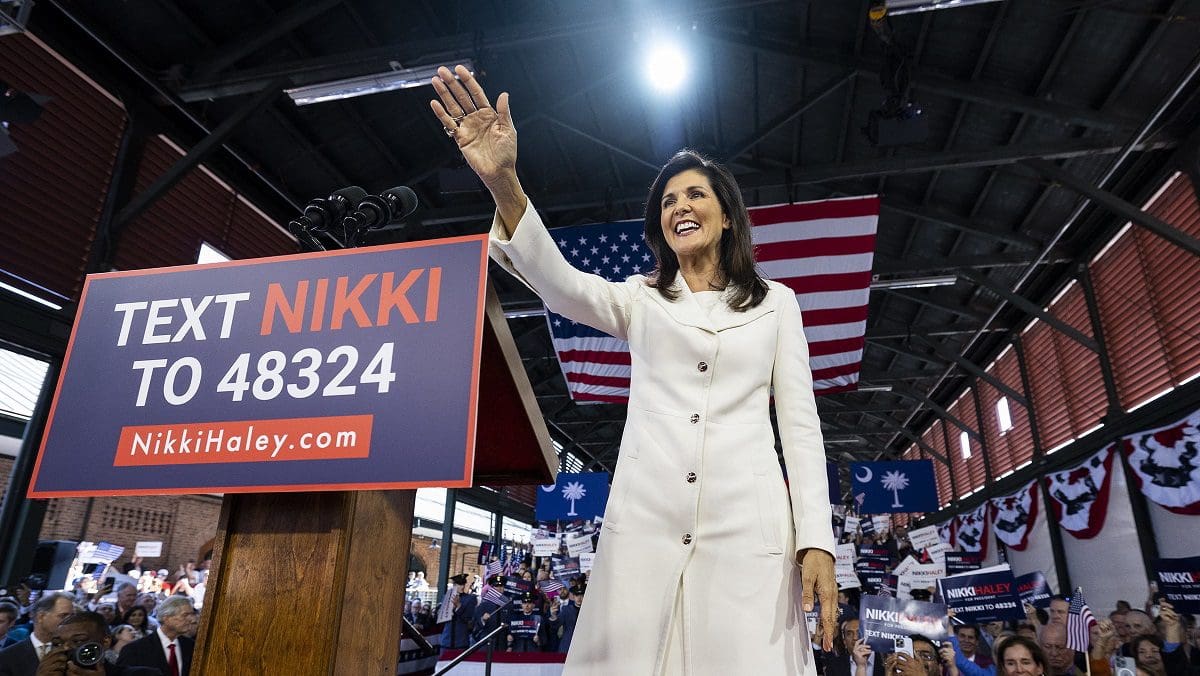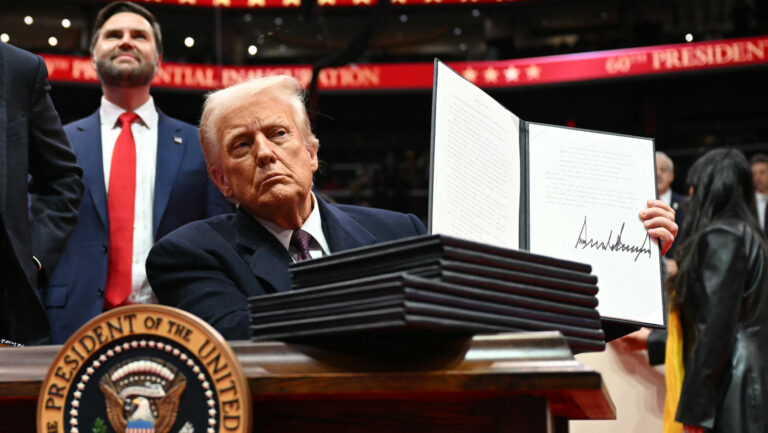Can the child of Indian immigrants be the next Republican presidential candidate?
Two weeks ago, Tuesday afternoon on Budapest time, Nikki Haley announced that she is formally seeking the Republican nomination for President in the 2024 election. With this move, she is challenging her former boss, 45th US President Donald J. Trump on the Republican side.[i] Although the former governor ranks fourth on the list of possible candidates according to surveys by the Trafalgar Group, her attributes and other elements of her political career may serve as unexpected advantages that can not only convince the voters, but also the Republican establishment.[ii]
Absurdly, all of this may be true because the political culture is very much affected by the woke side of the so-called ‘cultural war’, which emphasises the sociocultural characteristics of the individual. This woke political culture—dominating the United States, and especially the Democratic camp—has created an atmosphere in which Nikki Haley can simultaneously represent authentic conservative political ideas and be the voice of balance in the Republican political arsenal at the same time. She is the daughter of immigrant parents, but strongly rejects illegal immigration. She does consider identity politics to be harmful, but she is not afraid to develop political capital from her supposed marginalised minority status when she can.
As Governor Haley said in Charleston, South Carolina at her first political rally after her announcement: ‘May the best women win’. Her answer to President Joe Biden—who has claimed in the past that America is racist—is simply the following: ‘Take it from me, the first minority female governor in history, America is not a racist country’.
NIKKI HALEY: "Take it from me, the first minority, female governor in history, America is not a racist country!" pic.twitter.com/CWcdaGci8W
— Bienvenido (@bienvenido_us) February 16, 2023
As many pundits point out, in the coming weeks, several promising presidential aspirants are expected to announce their candidacy in the conservative camp. It is still not clear how big a parcel the Trumpist wing forms within the Republican Party’s organisation and voter base. However, this much is certain: the progressive left, Black Lives Matter, and various other identity-politics issues have become unavoidable phenomena in American public life. If the Republicans ignore them, their strategy can hardly be successful.
Who is Nikki Haley?
Her parents are first-generation Indian immigrants, whose national traditions are still vividly present in their lives.[iv] As she stated: ‘My father wore a turban. My mother wore a sari. I was a brown girl in a black-and-white world.’[v]
Haley was born in South Carolina in 1972. Her political career began in the 2000s. First, she was a Member of the South Carolina House of Representatives from 2005 to 2010, then she surprisingly won the state’s gubernatorial election in 2010 and retained her position until 2017. Thereby Haley became South Carolina’s first minority and first female governor.
During her time in office, she imposed a strict immigration policy and also tightened abortion laws.
In 2015, a tragedy shook the state.[vi] In the city of Charleston, a young man, motivated by his racist ideology, killed nine Afro-Americans. After the mass murder, the controversy surrounding the Confederate flag flared up again, which made Haley reconsider her traditional conservative position on the issue. Heeding the calls of those who wanted the flag to be removed from the South Carolina State House, the symbol was eventually taken off of the building. At this point, it has become clear that Haley, who is otherwise a staunch Republican, does not lack political skills when it comes to creating compromise.
The chaotic conditions around the 2020 election painfully pointed out that there is nothing new under the sun since Machiavelli: finding a balance between compromise and fighting is one of the most essential dilemmas for every politician. Haley passed this exam in 2015. Whether the Confederate flag is a symbol of respect for traditions or division and oppression, she made it clear that ‘there was no need for the state to decide who was right’.[vii] However, her real fame undoubtedly originated from her role as UN ambassador, when it became obvious that Haley is the old-fashioned Republican who puts American interests first at all times in foreign policy. Concerning the UN’s biased positions on Israel, she declares that ‘there is a new sheriff in town’; while she is also starting a debate with her former ‘boss’ Donald Trump about the sanctions against Russia, urging stronger action.[viii] She was also relentless towards Russia when foreign interference in the 2016 presidential election was investigated. Her criticism is concise and categoric, calling the meddling ‘real warfare’.[ix]
All of this points to different concepts competing in the Republican camp. From Europe, it is difficult to determine whether the Trump era has brought on profound changes in the structure of the Republican voter base. America is changing. However, the changes in society appear quite differently through social media than through the perspective of the cultural elite who have strengthened their positions during the Biden era.
There is no doubt that voter attitudes are also changing together with society. One of the most interesting phenomena of the 2020 elections, for example, was electoral mobility among the Spanish-speaking population.[x] Several experts said that without the support of Mexican-Americans, Trump would not have been able to win Florida’s 29 electoral votes. The 2024 election will be an important measure of these profound changes that cannot be seen through the approach of daily news and press attractions. The following months will show us whether ‘the Trump phenomenon’ is a function of a protest mood or a more significant socio-cultural transformation, and they will also tell us how big a role the Republican Party has in today’s American public life.
Nikki Haley intends to answer this question. In addition to her powerful and, if necessary, outspoken style as UN ambassador, her foreign service in the spirit of ‘America First’ brought her recognition within her party as well. In some cases, her contrarian actions, which even meant a confrontation with the President himself, created an independent political character for herself.
What does all this mean in a presidential campaign?
Nikki Haley wants to represent an alternative way in the Republican Party, one with a Republican worldview and conservative emotions, but through her personal story, as an opportunity to defeat the progressive Democrats on their own turf. Her success depends, among other things, on her ability to make the Republican elite understand her dualistic message: she is not just a Republican candidate with a Republican voice. With her immigrant parents and personal history, she is also ready to advance her beliefs in American public life, where the culture war is affecting almost everything.
To figure out what are the classic Republican elements in her platform and what ideas can make her the voice of an independent political alternative, it’s useful to examine her communication. What is noticeable at first sight is that she emphasises her experience as governor. It is also symbolic that her announcement about her presidential ambitions took place in Charleston. Referring to these early experiences, she outlines her economic agenda, most importantly, lowering taxes.[xii] In her speeches, she regularly refers to the idea of ‘less government’, and she also emphasises the lack of competence among the Washington elite.
How Is Nikki Haley Different From Other Republican Candidates?
It is no coincidence that the idea of generational change has been strongly emphasised in her public speeches from the beginning. One of her ‘hottest takes’ is that she would introduce a mandatory mental test for politicians over the age of 75. Haley criticises the political elite and Joe Biden personally, whom she sees unfit to face the challenges of the 21st century, for the weakening of America’s position on the international stage.[xv] As she stated: ‘America is not past our prime. It’s just that our politicians are past theirs’.[xvi]
Women’s issues also play a dominant role in her communication. After the political era marked by Donald Trump, both the idea of generational change and women’s issues are clear messages not just for her personally, but for her political party as well. Several pollsters pointed out that the Republicans recorded significant losses among women voters in recent years. In this regard, Nikki Haley is described by New York Times columnist Maggie Astor as ‘someone who broke the party’s white, male mould and could walk fine political lines, rejecting some right-wing extremes without alienating too many base voters’.[xvii]
Haley’s comic interpretation of her own role is described by herself as such: ‘I don’t put up with bullies…And when you kick back, it hurts them more if you’re wearing heels.’[xviii] This can be interpreted as her intention to prove she is the candidate who is able to address an important social stratum for the Republicans.
For a long time, it will remain an open question who will be the one to fight the battle on the Republican side in 2024. However, the importance of having a good grip on the situation for the Republicans is shown by the fact highlighted by Haley. As she stated in Charleston: ‘We’ve lost the popular vote in seven of the last eight presidential elections.’ As she stressed in her Twitter message: ‘Our cause is right—but we have failed to win the confidence of a majority of Americans’.
I have a particular message for my fellow Republicans: We’ve lost the popular vote in seven of the last eight presidential elections.
— Nikki Haley (@NikkiHaley) February 15, 2023
Our cause is right—but we have failed to win the confidence of a majority of Americans.
Well—that ends today.
If you’re tired of losing,… https://t.co/djRamOhtRp
To understand her point of view, we have to look back to 1992. From that year onward to this year, Republicans won the popular vote in a presidential election just once (!), in 2004, when incumbent President George W. Bush beat Massachusetts Senator John Kerry. Both in 2000 and in 2016, the party won the White House while losing the national popular vote, the fourth and fifth time this has happened in American history, after 1824, 1876, and 1888.[xxi]
[i]https://www.facebook.com/NikkiHaley/videos/2472746059544920/
[ii]https://www.bbc.com/news/world-us-canada-64489485
[iv]https://www.britannica.com/biography/Nikki-Haley
[v]https://www.facebook.com/NikkiHaley/videos/1285807075382207
[vi]https://www.britannica.com/biography/Nikki-Haley
[vii]https://www.nytimes.com/2023/02/14/us/politics/nikki-haley-career-background.html
[viii]https://mandiner.hu/cikk/20230202_nikki_haley_amerika_elnokjelolt
https://www.nytimes.com/2023/02/14/us/politics/nikki-haley-career-background.html
[ix]https://mandiner.hu/cikk/20230202_nikki_haley_amerika_elnokjelolt
[x]https://foreignpolicy.com/2020/11/06/trump-anti-communist-foreign-policy-won-florida-hispanics-latino-cuban-vote-miami-dade/
[xii]https://www.facebook.com/NikkiHaley/videos/2472746059544920/
[xv]https://www.britannica.com/news/2084403/bb059ae113e39152f5007864b4d139ae
[xvi]https://www.facebook.com/NikkiHaley/videos/1285807075382207
[xvii]https://www.nytimes.com/2023/02/14/us/politics/nikki-haley-career-background.html
[xviii] https://www.facebook.com/NikkiHaley/videos/2472746059544920/
[xxi]https://www.britannica.com/topic/United-States-Presidential-Election-Results-1788863







